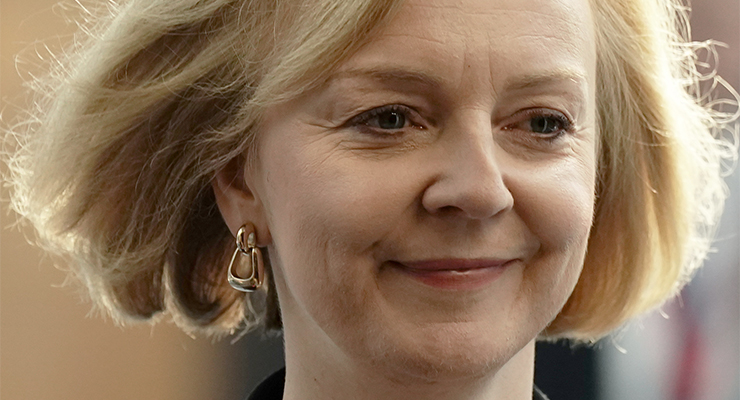
There is a rare iron law in British politics. New prime ministers enjoy a honeymoon with the electorate. The soaring poll ratings can be short or long, but the instinctive immediate reaction of voters is to give a new ruler the thumbs up. Liz Truss has not just violated an iron law. She has blown it apart in the most spectacular act of arrogant folly in modern times.
Her tenure in Number 10 may be short but will be analysed with dark fascination by historians in years to come. How could Truss and her chosen new chancellor, Kwasi Kwarteng, have acted so recklessly and with such impatient speed, unleashing their laughably described “fiscal event” without thinking through the dire consequences? Why did they not realise there was no political space to cut the top rate of tax for the wealthiest? After triggering market turmoil, how could Kwarteng suggest that there will be more tax cuts to come?
Depressingly for a post-Brexit economy that was already fragile, the answers have little to do with Truss’ tendency towards shallow impulsiveness or Kwartang’s wayward attention span. It was worse than that. The crisis that exploded around Truss within days of her becoming prime minister was part of a grim sequence in which the once resolutely pragmatic Conservative Party has come closer to being a revolutionary cult.
Before we get to that point, let us look at how Truss is already a prime ministerial freak by being so unpopular at such an early stage of her leadership. Most new prime ministers who arrive in Number 10 mid-term without winning an election choose to be expediently modest. They are deeply aware that they have no personal mandate from the voters and that they need to appease internal doubters.
When John Major replaced Margaret Thatcher in 1990, he promoted some of her more ardent followers, including Michael Portillo, the idol of the Thatcherites. There were tonal changes and Major scrapped the calamitous poll tax but there were no huge leaps in economic policy. Although there were bumps en route, Major’s honeymoon with the voters lasted until he won an election in 1992.
In 2007, Gordon Brown was even more accommodating to internal opponents and in terms of policy. Supporters of Tony Blair were given prominent posts in the cabinet and he moved with extreme caution in terms of marking a distance with the immediate past. Brown’s honeymoon was so buoyant that when Northern Rock came close to collapse in the late summer of 2007, his poll ratings went up. It was then that Brown turned to his close ally, Ed Balls, and raised the possibility of an early election. These were words that propelled Brown towards his doom. But at least he got the honeymoon.
Ten years later, Theresa May was enjoying such a rapport with voters that she did indeed call an early election. She was 20 points ahead in the polls and had been popular from the moment she replaced David Cameron. May also got the early balance right, signalling a change from Cameron and George Osborne’s turbocharged Thatcherism by proclaiming the “good the state can do” but seeking an accommodation with the Brexiteers by giving their leading advocates top positions in her cabinet.
Boris Johnson was closer to the Truss model when he acquired the crown in July 2019, purging his cabinet and parliamentary party of all internal critics, willing to break the law in proroguing Parliament in order to pull out of the EU against the will of most MPs at the time. But he did so against the backdrop of a benevolent political context. He was well ahead in the polls, a prime ministerial novelty that pretended to be speaking for the “people” against the “elites”.
Until her u-turn on the 45p tax rate, Truss was breaking all records in early self-confident assertiveness followed by record-breaking levels of unpopularity for a new prime minister. Within hours of entering Number 10 she had purged her cabinet of Rishi Sunak’s allies and asked the widely respected permanent secretary at the Treasury to resign. The Office for Budget Responsibility was told that its considered evaluation would not be required when Kwarteng announced his shallow tax-cutting revolution.
Without winning a general election she was not only ripping up the manifesto on which the Conservatives had won a near-landslide in December 2019, but behaving like a caricature of Margaret Thatcher on speed. The inevitable consequences followed. Sunak’s supporters, including recent cabinet ministers and other Tory MPs, railed in particular against the tax cut for the affluent and the shallow revolutionaries had to retreat.
Truss misreads Thatcher. She can dress up like her heroine and stare as wilfully as Thatcher did in the 1980s but she does not understand how the self-proclaimed Iron Lady led. At her peak, Thatcher was a smart reader of the political rhythms. Instinctively she sensed how far she could go. In the early years, she crammed her cabinets with ministers she viewed with disdain. Openly she called them the “wets” for challenging her economic experiment. But she kept them in her government until she felt in a strong enough position to dump them.
When she declared with machismo that “the lady’s not for turning”, she had in reality sanctioned a significant u-turn, loosening her support for rigid monetarism when it showed few signs of working. Nigel Lawson’s famous tax-cutting budget did not take place until 1988. Thatcher had been prime minister for nearly nine years, much time to clear the ground.
In crazy contrast, Truss and Kwarteng unveiled their tax-cutting plans within days and with no costs attached. Truss is a terrible reader of the political rhythms and cannot communicate as Thatcher was able to do.
A radical must be a brilliant political teacher in order to succeed. When Thatcher was going through her fleeting support for a pure form of monetarism, she used to compare the contentious economic theory with her father’s shop in Grantham: “My father never spent more than he earned and a country can’t spend more than it earns”. The comparison was dubious on many levels but accessible to every voter.
Truss is an awkward and hesitant communicator. She struggles to explain why she acts in the way she does. Like the rest of us she wants economic growth. Why will her tax-cutting zealotry deliver? There is no equivalent anecdote from Truss of Thatcher’s father and his grocer’s shop.
But overlooking Thatcher’s expedient guile that accompanied her simplistic convictions is a common and fashionable error. It is not by any means enough to explain the hole that Truss has dug for herself.
As she and Kwarteng were preparing their package of tax cuts that few were calling for, why was there no exploration of the consequences? The depressing answer is that Truss is surrounded by true believers. Her Number 10 is recruited partly from think tanks that have been in a cocooned fantasy world for decades pumping out ideas safely untested by proximity to power.
Prominent evangelicals from the Taxpayers’ Alliance and the Institute for Economic Affairs were not going to warn her about the dire implications of policies they have been advocating for decades. The discussions in the build-up to Kwarteng’s statement took place in an intoxicating atmosphere of uncritical but shallow revolutionary zeal. The free market evangelicals did not wish to contemplate turmoil in the markets they worship.
Brexit laid the ground for what is happening, which is why this goes much deeper than impulsive recklessness. The Brexiteers prevailed by sneering disdainfully at the “elites” and the experts. Truss is both a Brexit convert and a follower of the manner in which it was secured. Ideological instinct and prejudice are what count in the formation of policy. In this case the hardline Brexiteers always assumed that a low tax small state economy would follow the UK’s departure from the EU. Kwarteng’s bizarre mini-budget was their thoughtless dream come true.
Even an ideological self-confident prime minister like Truss will be traumatised by what has happened. All prime ministers that have endured market turmoil and a collapse in the opinion polls never recover fully. Harold Wilson was the popular moderniser until he was forced to devalue in 1967. John Major had won a triumphant election victory in April 1992. When the pound was forced out of the exchange rate mechanism in September of the same year, he aged quickly and looked drained for the rest of his time in power.
Truss is naive enough to assume she will be proved right at some point. But she is a human being. She awakes to the bleak opinion polls, the humiliating verdicts of the markets that also threaten to wreck her misjudged plans for growth, the noisy criticism of a media that usually hails new prime ministers, especially Conservative ones. Above all her MPs lurk, the supporters of Sunak, the former chancellor himself, those that she has sacked, MPs fearing their seats will be lost.
This is astonishing for a new prime minister who emerged victorious in a leadership contest just weeks ago. She should not be having to worry about such intimidating factors — for a bit, at least.
But she is unique as the prime minister who has had no honeymoon and she has only herself to blame.








Actually, the new governments tax cut policy and subsequent flip flop was a great success.
You see, Kwasi Kwarteng had cocktails with his hedge fund mates immediately before announcing the policy. They put their bets on, collected big, and then for all we know, won big again on the reversal.
The game inside the game is the real game for this government. They are making hay while the sun doesn’t shine.
“the most spectacular act of arrogant folly in modern times.” I would have thought that was the numbskulled Brexiteers who wnet into what seems to be becoming more and more of a catastrophe without a single sign of a plan as to how it might work. Given that the whole project was based on the lies of Johnson and his allies and the funding by Russia of Farage, it ought not to surprise us though I suppose.
Same swamp, different sock puppets….
Watching from afar, it’s hard to imagine to get a less competent person than Boris Johnson. Yet I stand corrected. More than a decade of Tory rule, it turns out there really are nothing more than “yes men” and stooges remaining. Anyone competent or cares about the future of Britain is either gone or marginalised.
It takes quite a spectacular incompetence to take the news cycle away from a dead Monarch. So well done Truss for that!
At least ERII has been spared the weekly meetings with Truss.
Charles having to deal with Truss is a fate I heartily welcome for both of them.
Charles is dealing with EIIIR
It’s a miracle. The perceived impossibility of discovering a less competent incumbent than Bojo smashed by the reality of not only discovering two but installing them into the top jobs.
This is the sort of improbability materialising that has tempted me to buy a Tatts ticket.
The surprise is … the surprise. Anyone who read Britannia Unhinged would have shorted sterling and long-dated gilts as soon as Truss got through to the Tory last two. There was never any chance a Wykehamist would be elected leader.
Anyone who read Britannia Unhinged would have shorted sterling and long-dated gilts …
And I have read reports in the UK press that suggest that that is exactly what those who would have benefitted most from the proposed tax cuts did.